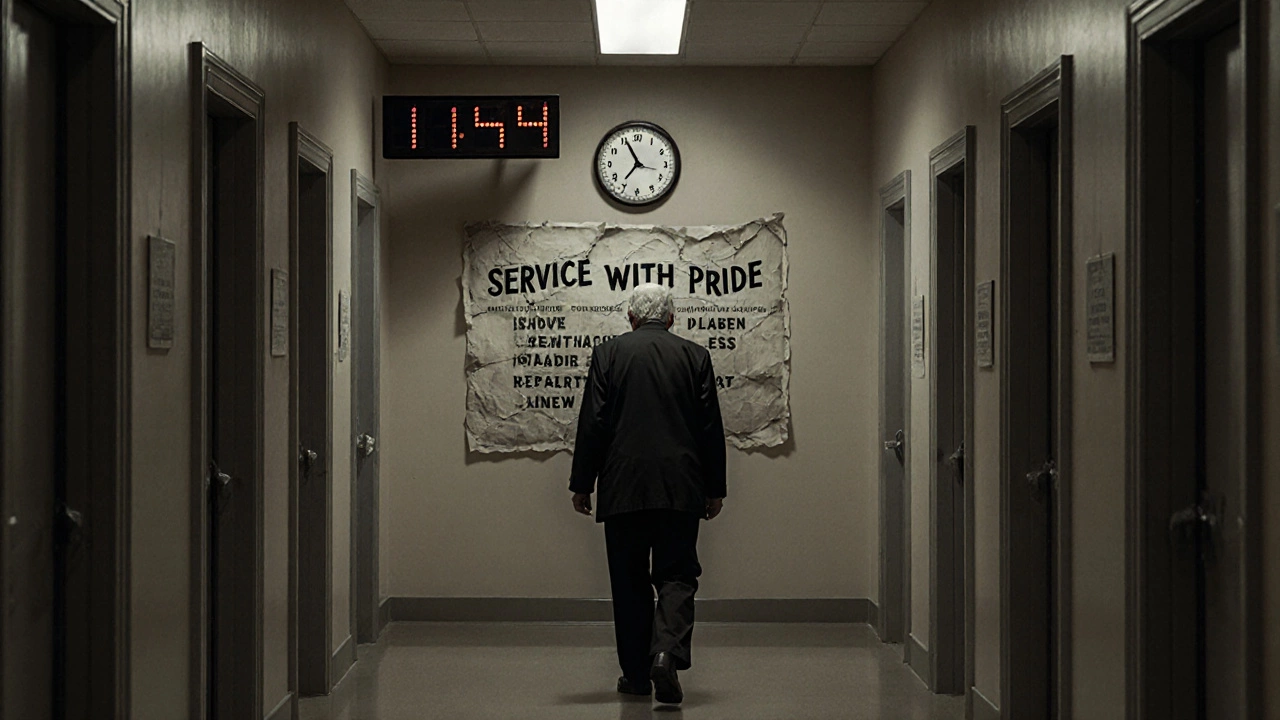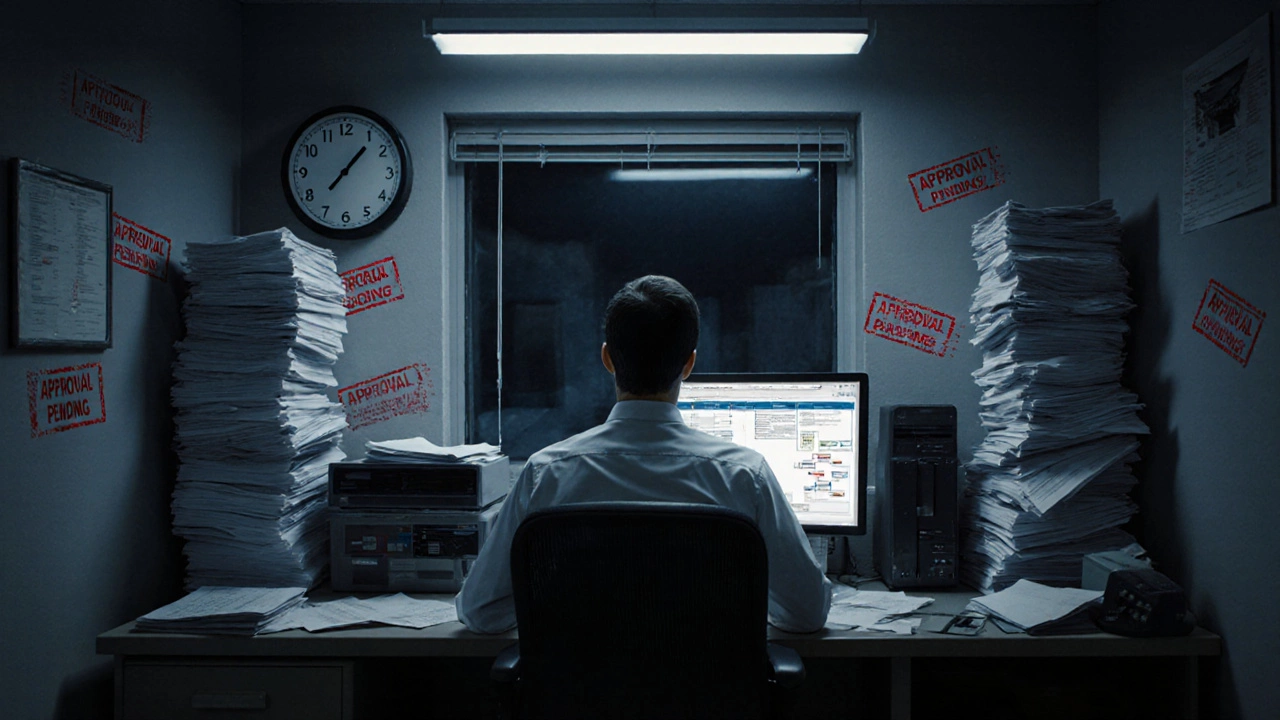Government Job Trade-Off Calculator
How Government Jobs Stack Up Against Private Sector
See realistic comparisons based on your current situation
Your Comparison Results
After 5 years in your current role, you could potentially earn $ more in the private sector.
This means a total difference of $ over 5 years.
Promotion Timeline
Government: more years to mid-level
Private Sector: more years to mid-level
Work-Life Balance
Government:
Private Sector:
Based on industry data from the article. Actual results may vary based on specific agency, location, and performance.
Everyone talks about the perks of a government job-job security, steady pay, health benefits. But few ask the hard questions: What do you actually give up for that stability? If you’re considering a government job, you need to know the full picture, not just the brochures.
Slow Career Growth
Government jobs don’t reward hustle the way private companies do. Promotions often depend on seniority, not performance. You could be doing exceptional work, but if the person above you hasn’t hit their five-year mark, you’re stuck. In many departments, it takes 7 to 10 years to move from entry-level to mid-level. Compare that to a tech startup or sales firm where high performers can jump two levels in two years. That’s not a myth-it’s standard policy in most public sector roles.
There’s no real incentive to innovate. If you streamline a process that saves 200 hours a year, no one gives you a bonus. You might get a quiet nod. But if you make a mistake, even a small one, there’s a paperwork trail that follows you for years. The system protects itself, not the employee.
Low Pay Relative to Skills and Effort
Yes, the salary is stable. But it rarely matches what someone with the same education and experience could earn in the private sector. A civil engineer with a master’s degree working for a state transport department might earn $65,000 a year. Meanwhile, a private firm in the same city pays $95,000 for the same role-with bonuses, stock options, and faster raises.
It’s worse for roles like IT, finance, or data analysis. Government agencies often pay below market rate because they can’t compete with private sector salaries. You’re not being paid for your skill-you’re being paid for your compliance. That’s not a critique of the people who work there. It’s a flaw in the system.
Bureaucratic Red Tape That Drains You
Ever tried to get a simple approval? Like changing your office printer or ordering new laptops? In government offices, it’s not uncommon to need signatures from five different people across three departments. Each step requires forms, waiting lists, and compliance checks. One employee in a federal agency told me she spent six months trying to get a new software license approved. The software was cheaper than a coffee machine. But the process? It took longer than setting up a small business.
Decision-making is slow because accountability is spread thin. No one wants to be the one who made the call that went wrong. So everything gets passed up. Meetings multiply. Deadlines stretch. You learn to manage expectations, not deliver results.

Limited Autonomy and Creativity
Government jobs don’t let you experiment. You follow protocols. You stick to scripts. You can’t try a new approach unless it’s been reviewed, approved, and documented by a committee. In a private company, if you have a good idea, you pitch it. In government, you write a proposal, wait three months for feedback, revise it, wait again, and then get told it’s outside your scope.
Teachers in public schools, for example, are often forced to teach to standardized tests-even if they know their students learn better through project-based learning. Nurses in public hospitals can’t change shift schedules to reduce burnout because policy says otherwise. The system doesn’t trust individual judgment. It trusts rules.
Work-Life Balance Isn’t What You Think
People assume government jobs mean 9-to-5 with weekends off. That’s not always true. Many roles-especially in law enforcement, tax collection, social services, and public health-require on-call shifts, overtime without extra pay, and weekend work. And when you do work extra hours? You can’t log them. You’re expected to absorb it as part of the job.
And there’s no flexibility. Remote work? Rare. Flexible hours? Almost nonexistent. If your kid gets sick, you need to use leave days. No sick leave for emergencies unless you file a form and get it stamped. You trade freedom for security-and often, you end up working more, not less.
Stagnation and Mental Fatigue
Repetition kills motivation. Do the same tasks, with the same people, using the same outdated software, for 10 years? It wears you down. You stop learning. You stop growing. Many government workers describe feeling like they’re in a holding pattern. They’re not fired. But they’re not moving forward either.
Studies from the Australian Public Service Commission show that after seven years, over 40% of public sector employees report feeling emotionally drained. Not because they’re overworked-because they’re under-stimulated. The lack of challenge leads to disengagement. And disengagement leads to burnout that’s harder to recover from than stress from a high-pressure job.

Public Scrutiny and Lack of Privacy
Working for the government means your work is public property. Your emails can be requested under freedom of information laws. Your performance reviews might be accessible to anyone who files a request. Your mistakes become headlines. One minor error in processing a welfare payment can turn into a national scandal.
You don’t get the luxury of privacy. Your personal life becomes part of your professional profile. If you post something controversial on social media-even if it’s unrelated to your job-you could face disciplinary action. That’s not paranoia. It’s policy.
Job Security Comes With a Price
Yes, you won’t get laid off during a recession. But that security locks you in. If you hate your job, you’re stuck. Quitting means walking away from pensions, health benefits, and seniority credits that take decades to build. Most people stay because they can’t afford to leave-not because they want to.
And if you do try to move on? Private employers often see government experience as outdated. Your skills might not transfer. Your resume looks too rigid. Your references come from people who’ve never worked outside the system. That’s the hidden cost of job security: it makes you less marketable in the real world.
Is It Worth It?
Government jobs aren’t bad. For some people, they’re perfect. If you value routine, predictability, and low risk, they’re ideal. But if you want to grow fast, earn more, solve problems creatively, or have control over your time-they’re not the right fit.
Don’t choose a government job because it’s safe. Choose it because you genuinely want to serve in that role. And if you’re unsure, test it first. Try a contract role in the public sector. Work as a temporary employee. See how the system really works before you commit your career to it.
There’s no shame in wanting more. And there’s no glory in staying stuck.
Are government jobs really more secure than private sector jobs?
Yes, in terms of layoffs-government jobs are more secure during economic downturns. But that security comes with trade-offs: slower promotions, lower pay, and less flexibility. You’re protected from being fired, but not from being stuck. Private sector roles can be riskier, but they also offer faster advancement and higher earnings if you perform well.
Can you make more money working in the private sector with the same qualifications?
Absolutely. In most fields-engineering, IT, finance, law-private sector roles pay 20% to 50% more than equivalent government positions. Bonuses, stock options, and performance raises aren’t common in public sector jobs. The trade-off is stability over income growth.
Do government jobs offer better work-life balance?
Not necessarily. While some roles follow a 9-to-5 schedule, many-like social workers, police, tax auditors, and public health staff-work irregular hours, weekends, and on-call shifts. And unlike private companies, government agencies rarely offer remote work or flexible scheduling. The idea of perfect work-life balance is a myth for most public sector employees.
Is it hard to leave a government job later in your career?
Yes. After 5-10 years in government, your skills can become outdated compared to private sector standards. Employers may see your experience as rigid or overly bureaucratic. Re-entering the private market means starting over in many cases-especially if you’re in a highly specialized role with no market equivalent. The pension and benefits make leaving tempting, but the career transition can be painful.
Do government jobs discourage innovation?
They often do. Innovation requires risk, and government systems are designed to avoid risk. New ideas need layers of approval, documentation, and compliance checks. Many employees stop proposing improvements because the process is too slow or they’ve been told “that’s not how we do it” too many times. The culture rewards consistency, not creativity.
